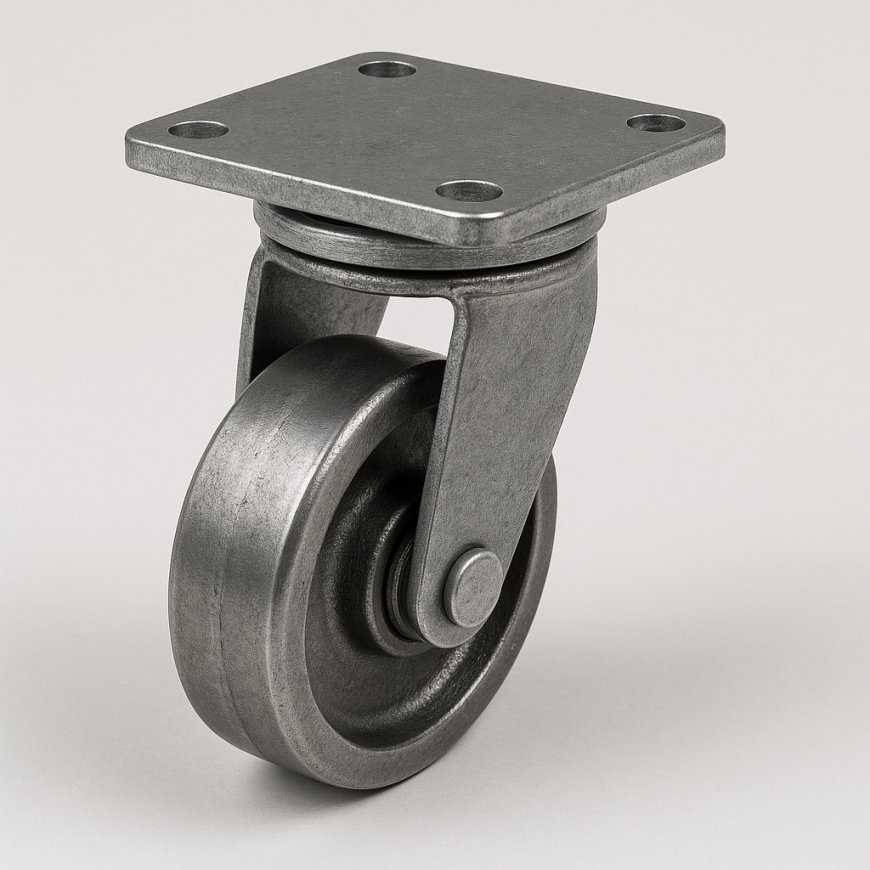What Are Single Wheel Steel Casters and When to Use Them?
Learn what single wheel steel casters are, when to use them, and how they improve performance in tough environments. Discover top manufacturers and expert tips.

In industrial environments where durability and load capacity are critical, single wheel steel casters offer unmatched performance. These rugged casters are ideal for transporting heavy loads, navigating harsh surfaces, and enduring high-impact conditions.
This guide explores how single wheel steel casters work, where they excel, and when theyre the ideal solution over other caster types. Youll also learn about key configurations such as locking steel casters and solid steel casters and which industries rely on them most.
Understanding Single Wheel Steel Casters
A single wheel steel caster is a wheel-and-mounting assembly made primarily of steel, featuring one durable wheel (as opposed to dual-wheel configurations). These casters are built for strength, longevity, and shock resistance, making them a top choice in environments where synthetic or softer materials fall short.
Common Features:
- Solid or welded steel construction
- Heat-treated components for longevity
- Precision bearings for smoother operation
- Swivel or rigid mounting options
- Optional locking mechanisms
Key Applications and Use Cases
1. Heavy Manufacturing
Heavy duty steel casters are often used on steel plates, dies, molds, and machinery carts. Their load-bearing capacity and resilience to heat and impact make them perfect for metal fabrication and machining environments.
2. Automotive & Aerospace
Industrial single wheel steel casters are commonly found in aerospace ground support equipment (GSE) and auto assembly lines where equipment movement must be smooth yet incredibly strong.
3. Outdoor & Rough Terrain Use
Steel wheel casters excel on concrete, metal grating, and uneven surfaces where polyurethane or rubber wheels would wear out quickly.
When Should You Use Single Wheel Steel Casters?
Knowing when to use single wheel steel casters is critical for maximizing ROI and safety. Here are the ideal conditions:
- Load capacities exceed 2,000 lbs per caster
- Surface conditions are hot, abrasive, or uneven
- Shock loading is a regular concern
- Environments include oil, grease, or chemicals
- Precision mobility is required with limited space
Comparing to Other Caster Types
Steel Casters
- Load Capacity: Very High
- Floor Protection: Minimal
- Heat Resistance: Excellent
- Wear Resistance: Excellent
- Cost: Moderate
Polyurethane Casters
- Load Capacity: Moderate to High
- Floor Protection: Good
- Heat Resistance: Poor
- Wear Resistance: Good
- Cost: High
Rubber Casters
- Load Capacity: Low to Moderate
- Floor Protection: Excellent
- Heat Resistance: Poor
- Wear Resistance: Poor
- Cost: Low
Available Configurations
Locking Steel Casters
Equipped with a brake mechanism, these casters prevent unwanted rolling ideal for assembly lines and safety-critical environments.
Solid Steel Casters
These are often machined from a single block of steel, offering superior durability and virtually zero risk of structural failure.
Custom Single Wheel Steel Casters
When standard models cant meet your applications specs, custom single wheel steel casters can be engineered with specific mounting plates, bearing types, and finishes to match your environment.
Benefits of Single Caster Wheels in Steel Form
Whether you call them single caster wheels, steel super single wheels, or steel caster wheels, their benefits include:
- Long life span in rugged conditions
- Resistance to warping under extreme weight
- Low maintenance requirements
- Versatility in swivel or rigid formats
- Consistent performance in automated and manual applications
Top Manufacturers of Single Wheel Steel Casters
When selecting high-performance casters, choosing the right manufacturer makes all the difference. Some of the top manufacturers in the U.S. specialize in precision-engineered steel casters designed for industrial reliability. These companies are known for:
- Custom engineering capabilities
- High-load capacity solutions
- Specialized applications such as cleanroom or extreme-duty
- U.S.-based production with tight quality control
Manufacturers like Caster Concepts, Aerol, and Reaction Industries stand out for their commitment to quality and performance. Theyre trusted across industries including aerospace, defense, heavy manufacturing, and industrial automation.
FAQ: Single Wheel Steel Casters
What is the load capacity of a single wheel steel caster?
It varies by model, but many heavy duty steel casters support between 2,000 to 10,000+ lbs per caster.
Are steel casters good for all floors?
Not all. While theyre ideal for concrete and steel surfaces, steel casters wheels can damage delicate floors unless paired with protective coatings or tread options.
Can I order custom steel caster designs?
Yes, many top manufacturers offer custom single wheel steel casters tailored to your specific dimensions, load, and environmental conditions.
Conclusion
Single wheel steel casters are essential in operations where strength, reliability, and performance under pressure are non-negotiable. Whether you need locking steel casters for stability or custom steel casters for unique specs, these rugged components deliver unmatched value in industrial applications.
For expert guidance and engineered solutions, consult a trusted caster manufacturer and explore the options best suited for your operational needs.


























